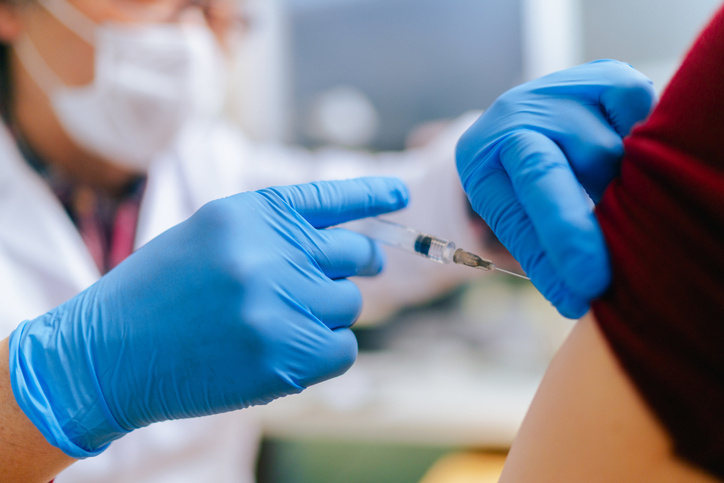
A new Health Order, in place since last week, made it mandatory for all border workers to have had at least their first Covid-19 vaccine.
Nine Customs staff in total have been fired since the Order came in.
An additional 13 managed isolation workers are also in the process of losing their jobs.
One of the Customs workers found out she was being fired for refusing the Covid-19 vaccine last Thursday. The next day, the termination notice came through.
The woman - who had been working for Customs at a regional port since late last year - has been left fuming at the decision.
She said her job was never considered high-risk enough to qualify for the mandatory Covid-19 testing which applied to all border workers.
"Those people that were covered under the required Testing Order, were registered under the Ministry of Health," the woman, whom RNZ has agreed not to name, said.
"And they're the ones that have fortnightly Covid testing, because they were regarded as high risk.
"We were never subject to any testing for Covid at all. I've never been tested for Covid."
She added none of her colleagues were ever tested for the virus either because of their day-to-day operations.
Some of those she works with have also refused to get the vaccine, and have also been fired.
She said they've also never had to wear PPE - personal protective equipment.
"The only time we had to wear masks was when we went up to level 2, and we couldn't be within a metre of each other. So we're sitting beside each other in a car so we had to wear masks. That was the only time."
Employment law advocate Ashleigh Fechney - who is representing four of the nine fired workers - said it makes no sense to sack a person who was never tested, or required to wear PPE.
"Those are big things," she said, "like it's not fair now to say you're high risk so you have to get the vaccine. But on the other hand, say you're not high risk enough to get tested."
No testing or PPE, so why vaccines?
In a statement, Customs' deputy chief executive of people and capability Jacinda Funnell explained the requirements for who gets vaccinated and who gets tested are different.
While the requirement for who gets tested applies to "anyone who has been in contact with an international arriving passenger or crew member in the previous fortnight," the requirement for who gets vaccinated is just "anyone who may come into contact with an international arriving passenger or crew member to be vaccinated".
The worker said she's not anti-vaccination, but feels it shouldn't be mandatory to have to receive a vaccine to continue their job.
The Health Order which makes vaccinations mandatory for some positions specifies exactly which positions it applies to.
Indeed it lists four separate groups in relation to port workers. But she argued none of them applies to her.
"I've never been exposed to anything that is, you know, listed in the schedule of the Order that ... came into effect at midnight on Friday.
"Why am I out of a job? What was the risk?
"Our jobs aren't affected by it," the worker argued. "I've never come across ... never interacted with a crew member, for any reasons."
Fechney argued the workers are not in positions high-risk enough to make it mandatory for them to get vaccinated.
She believed Customs would have been within their right to consider a case-by-case approach to which staff need to be vaccinated.
"But they didn't differentiate," Fechney said. "[Customs] just said, 'Everyone on those fixed term agreements across New Zealand are high-risk.'
"We didn't get the conversations about individual ports, we didn't get the conversation to say they were low-risk before, they weren't getting testing."
That argument was repeated by the worker.
"We've been lumped in with MIQ workers and airport workers and cleaners and, you know, people exposed to airborne particles and surfaces that have, you know, been potentially contaminated.
"That hasn't happened to us, but we've been lumped in with them and treated as though we're one of them. That's really unfair."
Change in messaging from Customs
Correspondence sent to staff from Customs, which has been seen by RNZ, showed constant reminders that while workers were being strongly encouraged to get vaccinated, it was not mandatory.
In an email sent on 12 February, workers were assured, "this is voluntary with no current negative consequences regarding being able to work."
Both the worker and Fechney are also annoyed at how Customs was giving assurances to its staff in correspondence from February that vaccines would not be mandatory.
In emails seen by RNZ, workers were being assured as late as mid-February that receiving a vaccine was not mandatory, and that refusal would have "no current negative consequences".
"From all the communication we'd had over like a two-week period, it was clear to me that this is something if you wanted it, you could access it," the Customs worker said.
"But if you didn't, opt out, don't worry about it: that was the clear message over two weeks."
But Funnell argued that their correspondence always aligned with government policy at the time, and "stated that while the vaccine would not be mandatory, there would be an expectation that staff at air and sea ports would be vaccinated."
Comments
"Correspondence sent to staff from Customs, which has been seen by RNZ, showed constant reminders that while workers were being strongly encouraged to get vaccinated, it was not mandatory" so much for that eh, sounds like customs overreacted and now people can't feed their family's because of customs poor decisions.












